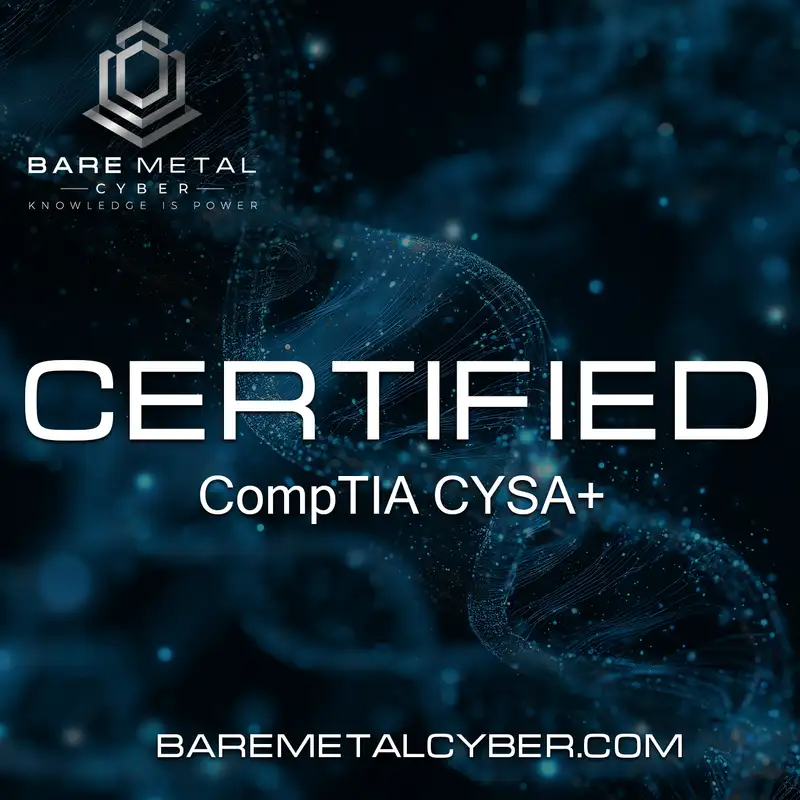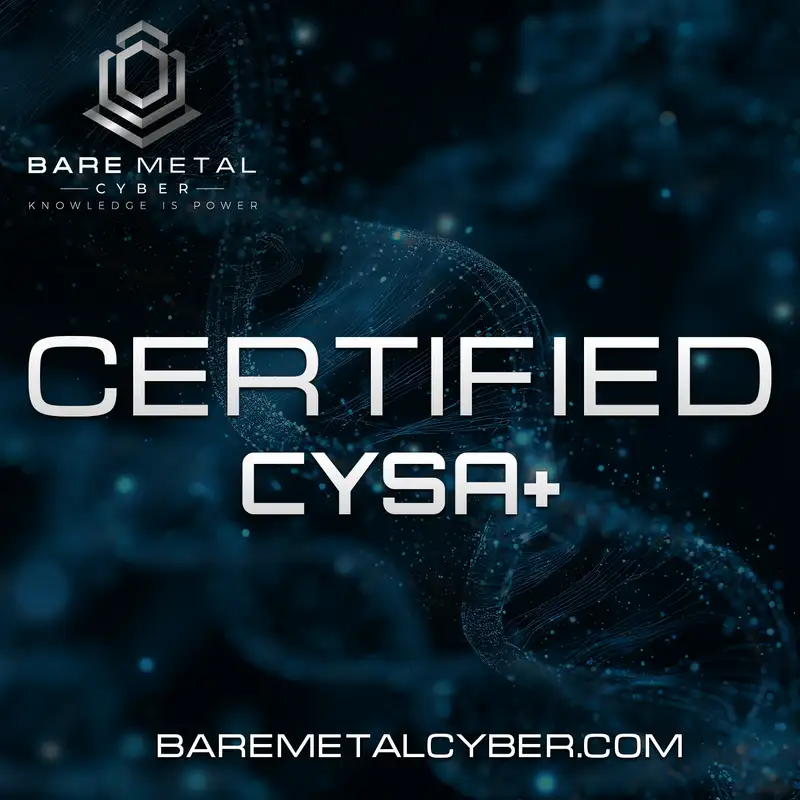Episode 10: Life After CySA+ Certification: Career Paths and Professional Growth
Episode 10: Life After CYSA Plus Certification — Career Paths and Professional Growth
Welcome to Episode Ten of the CYSA Plus Prep cast. Today, we’re stepping beyond exam preparation to explore what comes next—specifically, the career opportunities, advancement paths, and ongoing growth that open up once you’ve earned your CYSA Plus certification. While passing the exam is a major achievement, it’s also a launching point. This episode will help you envision the job roles available to you, identify professional development paths, and understand how CYSA Plus can shape your long-term cybersecurity journey.
Earning the CYSA Plus certification unlocks a wide range of career options across cybersecurity. The credential validates your ability to detect threats, analyze vulnerabilities, and respond to incidents—skills that are in high demand across industries. It qualifies you for roles that require a proactive, analytical mindset and the ability to translate technical data into actionable security measures. Whether you aim to stay hands-on or eventually move into leadership, CYSA Plus places you on a path of opportunity and credibility.
One of the most direct career paths available to certified individuals is working as a Cybersecurity Analyst or SOC Analyst. These roles align closely with the skills tested on the exam. In these positions, you’ll monitor security systems, interpret alerts from SIM platforms, and triage incidents in real time. You'll play a critical role in threat detection, risk evaluation, and response coordination. The job is fast-paced, detail-oriented, and ideally suited to professionals who thrive in environments where accuracy and quick decision-making are essential.
Another in-demand role is that of an Incident Response Analyst. This position focuses specifically on identifying, containing, and resolving cybersecurity breaches. Your CYSA Plus training prepares you to assess security incidents, understand attack vectors, and guide remediation efforts. In real-world situations, this role involves deep forensics, collaboration across departments, and rapid deployment of containment strategies to limit impact. It’s a role that rewards calm under pressure and disciplined investigative technique.
CYSA Plus also sets the stage for pursuing a career as a Threat Hunter. Unlike incident responders who react to alerts, threat hunters proactively search for hidden threats within systems and networks. They use advanced analytics, threat intelligence, and behavioral patterns to identify attacks before damage is done. The certification’s focus on indicators of compromise, vulnerability analysis, and SIM usage provides the ideal background for this kind of advanced proactive work.
For those drawn to offensive security, CYSA Plus also lays the groundwork for roles such as Vulnerability Analyst or even entry-level Penetration Tester. These roles require knowledge of scanning tools, risk prioritization, and security control assessment—all topics covered in the certification. While deeper offensive roles often require additional training, your foundational skills in vulnerability management and incident detection will support your ability to evaluate, test, and help secure systems from the ground up.
The credential also helps you transition from technical roles into team leadership. Many CYSA Plus-certified professionals move into positions such as Cybersecurity Team Lead or Security Operations Manager. These roles involve coordinating analyst teams, overseeing incident response workflows, and ensuring that security operations align with organizational goals. Your hands-on experience, combined with the credibility of your certification, positions you to lead with confidence and authority.
Across industries—finance, healthcare, education, government, technology—the demand for cybersecurity professionals with CYSA Plus-level skills continues to rise. These sectors face sophisticated threats and require experts who can interpret threat intelligence, mitigate risks, and manage ongoing detection and response. The certification’s vendor-neutral approach and alignment with real-world tools and frameworks make you a valuable asset regardless of the sector you choose to work in.
For IT professionals looking to transition into dedicated security roles, CYSA Plus acts as a strong differentiator. It communicates to employers that you’ve gone beyond general technical work to specialize in threat analysis and response. The certification often signals a turning point in career progression, especially for those coming from roles in network administration, help desk support, or system engineering. It demonstrates not just capability, but a commitment to cybersecurity as a long-term path.
From a financial standpoint, certified professionals often see substantial benefits. Surveys regularly report that cybersecurity professionals with certifications such as CYSA Plus earn higher salaries than their non-certified peers. Organizations are willing to pay a premium for proven skills, particularly when the certification covers applied, operational areas that affect real-time business security. Even entry-level analysts with CYSA Plus often find they can negotiate better compensation or position themselves more favorably for job openings.
In addition to salary advantages, CYSA Plus increases your career mobility. With validated, practical skills and a well-recognized credential, you can apply for a broader range of positions and move more fluidly between roles. Whether you want to pivot toward compliance, forensics, or cloud security, the knowledge base you gain through the certification remains applicable and transferable. This flexibility allows you to respond to shifting career interests or industry trends with confidence.
For more cyber related content and books, please check out cyber author dot me. Also, there are more security courses on Cybersecurity and more at Bare Metal Cyber dot com.
After earning your CYSA Plus certification, many professionals naturally consider their next step in continuing education. One of the most common paths is pursuing more advanced certifications, especially those aligned with senior technical roles or specialized domains. A logical continuation within the CompTIA ecosystem is the C A S P Plus certification, short for CompTIA Advanced Security Practitioner. This certification is intended for experienced security professionals looking to design and implement enterprise-wide security solutions, with a strong emphasis on hands-on, high-level technical problem-solving.
For individuals aiming toward cybersecurity leadership or managerial roles, certifications such as the Certified Information Systems Security Professional or the Certified Information Security Manager offer pathways into governance, policy-making, and risk management. These credentials validate your ability to lead security programs, align them with business objectives, and manage large teams or budgets. They also demonstrate to employers that you’ve moved beyond technical troubleshooting into organizational strategy—a critical leap for professionals transitioning into leadership.
Those interested in becoming specialists within the cybersecurity domain might consider certifications from the Global Information Assurance Certification program. These include the Certified Incident Handler, Certified Forensic Analyst, and Certified Threat Intelligence Analyst. Each certification provides focused training and assessment in a narrow but critical area of cybersecurity. Pursuing these certifications after CYSA Plus helps you deepen your expertise and signals a strong commitment to your chosen sub-field within the security profession.
But professional growth doesn’t stop at certifications. Actively participating in cybersecurity communities—both online and in person—can exponentially expand your exposure to new opportunities. Industry conferences, such as DEF CON, Black Hat, or local BSides events, are great platforms for learning and networking. Similarly, joining professional associations like ISACA, (ISC)², or local cybersecurity groups allows you to stay connected, discover job opportunities, and build meaningful relationships with mentors and peers in the field.
Ongoing skill development is equally critical. Certifications validate knowledge, but it’s continuous hands-on practice that keeps those skills sharp and applicable. Maintaining your personal cybersecurity lab, participating in Capture-the-Flag challenges, or engaging in red team and blue team exercises all contribute to deepening your capabilities. Many professionals build out advanced lab scenarios using cloud services, virtualization, or containerization platforms, pushing themselves into more complex operational and architectural simulations that reflect real enterprise challenges.
Cybersecurity is one of the most rapidly evolving technical domains. New threats, technologies, and compliance frameworks emerge regularly. Fortunately, the foundational skills developed through the CYSA Plus certification prepare you to evolve with the industry. From learning new detection methods to exploring AI-driven security solutions, your CYSA Plus background offers the agility to adapt. Whether you choose to move into DevSecOps, cloud security, or threat hunting, the underlying analysis and detection skills stay relevant.
In addition to developing hard skills, professionals who grow into leadership or advisory positions often find soft skills to be a major success factor. Effective communication, critical thinking, and problem-solving become essential when translating technical findings into business language. Whether you’re writing an incident report for executive leadership or presenting threat models to non-technical stakeholders, your ability to communicate with clarity and precision will determine your overall effectiveness and value.
Many certified professionals eventually move toward consulting or advisory roles. As a consultant, your job may involve assessing the security posture of organizations, identifying compliance gaps, or recommending process improvements. The analytical mindset honed through CYSA Plus studies translates well to these responsibilities. Moreover, the combination of certification, field experience, and communication skills positions you as a credible and trusted advisor to leadership teams across various industries.
Perhaps one of the most overlooked but powerful benefits of certification is community access. Once you pass the CYSA Plus exam, you join a global network of certified professionals. This community is active in forums, social media groups, Slack and Discord channels, and professional events. Engaging with this network opens up mentorship opportunities, collaborative learning, and even potential job referrals. It can also expose you to career paths you hadn’t previously considered or connect you with professionals solving similar challenges in different environments.
To summarize this episode, achieving your CYSA Plus certification is far more than a single milestone—it’s a doorway into a dynamic and impactful career. Whether you pursue roles in security operations, incident response, threat intelligence, or management, the skills validated by this certification form the bedrock of your professional identity. Continued growth through advanced certifications, community engagement, hands-on learning, and soft skill development will keep you competitive, relevant, and inspired. Keep listening to the Prep cast as we guide you further into the world of cybersecurity—one domain, one episode at a time.

